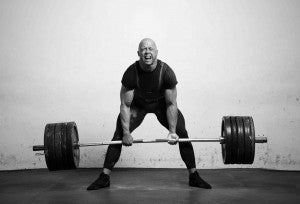

Less is More: Understanding Overtraining and Grow
Table of Contents
 Less is More: Understanding Overtraining and Grow
Less is More: Understanding Overtraining and GrowPrevious research in the Journal of Strength and Conditioning Research wanted to examine the anabolic factors involved in muscle recuperation. They took well-trained resistance trained men and they had them perform a leg routine, which consisted of leg presses and squats. They examined testosterone and took muscle biopsies to find out what was going on inside the muscle (i.e. IGF-1 and MGF). They were interested in the recovery process in muscle and serum hormones (i.e. testosterone and free testosterone) after intense leg exercise and what happens in the blood and in muscle seven days after a intense leg workout. Contrary to what most bodybuilders would think, basal testosterone and free testosterone concentrations remained unaltered after the exercise protocol. Additionally, there was no change in androgen receptor protein or mRNA expression in the thigh muscle, but IGF-1 and MGF) mRNA expressions were increased compared to pre-exercise levels. IGF-1 and MGF have growth factors related to tension overload in muscle. Once again, we have another study suggesting that muscle growth factors are important during tension overload. These findings also indicate that IGF-I and MGF responses may be related to acute regenerative processes in muscle because of exercise and may contribute to muscular adaptation to resistance exercise. Here is the most interesting part of the study that was found that may make you think twice about working legs twice a week! The researcher’s measured subjective measures of muscle damage which included subjective perception of physical fitness and found that recovery over a pre-exercise level of the present type of heavy resistance exercise can take approximately 6 days. So it may take longer for the nervous system to bounce back from an intense workout especially with large muscle groups; however smaller muscle groups such as the arms may recuperate faster. Now there are some interesting points made in the study: 1.) IGF-1 and MGF increased in muscle 48 hours after exercise, which suggests that these growth factors are actively involved in the adaptation and repair process in muscle. 2.) Muscles grow when they are resting, in the study the well trained men still did not feel physically recuperated until 6 days after intense exercise which means maybe the nervous system had not fully recovered after intense exercise.
 A previous study documented the hormonal responses of an elite Olympic weightlifter over a 21-week period. He was a 27-year-old male weightlifter who holds a national record in weightlifting. The subject had ranked top 5 in the world for several years prior to this study and ranked first in the world in 2005. At the end of 21 weeks high volume training followed by 6 weeks of light recuperation weight training, free testosterone peaked while free cortisol remained high after 6 weeks of taper. It indicated that the physiological stress induced by such training may last for more than 6 weeks even when the training volume was markedly decreased by more than 50%. Some bodybuilders train high volume but based on the science, once overtraining occurs even reducing the training volume by half still did not lead to a compete recuperation of anabolic hormones and more importantly cortisol levels had not fully retuned to baseline. More research needs to conduct but it seems like overtraining may take weeks to recuperate from! So it must be stated that the men were natural and not taking any drugs, but if they were taking drugs…they would have enhanced recuperation and could train sooner. So if your natural, take this research in mind that it can take up to 1 week before you are recuperated from an intense leg workout.
A previous study documented the hormonal responses of an elite Olympic weightlifter over a 21-week period. He was a 27-year-old male weightlifter who holds a national record in weightlifting. The subject had ranked top 5 in the world for several years prior to this study and ranked first in the world in 2005. At the end of 21 weeks high volume training followed by 6 weeks of light recuperation weight training, free testosterone peaked while free cortisol remained high after 6 weeks of taper. It indicated that the physiological stress induced by such training may last for more than 6 weeks even when the training volume was markedly decreased by more than 50%. Some bodybuilders train high volume but based on the science, once overtraining occurs even reducing the training volume by half still did not lead to a compete recuperation of anabolic hormones and more importantly cortisol levels had not fully retuned to baseline. More research needs to conduct but it seems like overtraining may take weeks to recuperate from! So it must be stated that the men were natural and not taking any drugs, but if they were taking drugs…they would have enhanced recuperation and could train sooner. So if your natural, take this research in mind that it can take up to 1 week before you are recuperated from an intense leg workout.

















